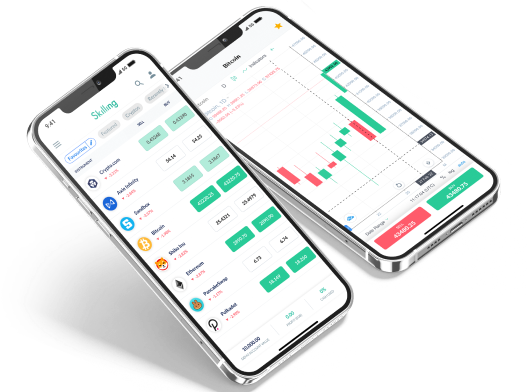Trading is a complex activity that requires a blend of analytical skills, market knowledge, and emotional discipline. While market fundamentals and technical indicators are often the focus, the psychological aspect of trading is just as crucial. For traders in regions with a high cost of living, such as Sweden and Norway, this psychological component is amplified by the financial realities of daily life. The high cost of housing, food, and services can create a heightened sense of financial pressure. This pressure can, in turn, lead to emotional pitfalls that undermine even the most well-researched trading strategies. This article delves into the unique psychological challenges faced by Swedish and Norwegian traders and offers a fact-based and practical perspective on how to navigate them with discipline and resilience.
Access 1,200+ global CFDs instruments.
Access a plethora of trading opportunities across the financial markets.

The Emotional Landscape of High-Cost Markets
The financial stress associated with a high cost of living is a real and constant factor for many. For a trader, this stress can directly translate into the trading process, affecting decision-making and risk tolerance. Understanding these psychological triggers is the first step toward managing them.
Fear of Loss vs. Fear of Missing Out (FOMO)
In a high-cost-of-living environment, the fear of losing money is intensified. A loss on a trade is not just a theoretical number; it's a portion of a deposit that could have covered rent or household expenses. This fear can lead to overly cautious trading, causing a trader to miss out on potential opportunities or close a profitable position too early to secure a small gain. Conversely, the high pressure to generate income can trigger the opposite emotion: a powerful fear of missing out (FOMO). Seeing a market surge can make a trader feel like they are falling behind, pushing them to enter a trade impulsively without proper analysis or a solid plan. Both of these emotions can lead to poor decision-making.
Revenge Trading and the Need to "Catch Up"
When a trader incurs a loss, a natural human instinct is to try to make it back quickly. This is known as revenge trading. In a high-cost-of-living market, the psychological need to recover a loss is particularly strong because the lost capital feels more significant. This can lead to a trader abandoning their strategy, increasing their position size, or entering trades on impulse in an attempt to "catch up" with what they feel they have lost. Revenge trading is a common path to even larger losses, creating a destructive cycle of emotional decisions. The pressure to maintain a certain lifestyle or simply meet monthly obligations can fuel this behaviour.
The Psychological Toll of Volatility
Market volatility is a fundamental part of trading, and experienced traders learn to manage it. However, when a trader’s financial stability feels tied to their trading account, volatility can feel like a direct threat. A sharp downturn in a market or an unexpected loss can trigger panic and anxiety. This can cause a trader to exit a position prematurely, not based on market signals, but based on an emotional reaction to the perceived threat. Over time, this psychological stress can lead to burnout, fatigue, and a loss of confidence. The perceived link between trading results and personal financial security must be addressed with a clear strategy.
Practical Strategies for Psychological Discipline
Effective trading in a high-cost-of-living market is not about eliminating emotions, but about managing them. Here are some practical approaches that prioritise discipline and objective decision-making over emotional reactions.
1. The Power of a Pre-Defined Trading Plan
A comprehensive trading plan is the most effective psychological tool. It acts as a set of rules that you follow regardless of market conditions or emotional state. The plan should outline everything: the instruments you will trade, your entry and exit criteria, and your risk management rules. By creating this plan when you are calm and rational, you remove the need for impulsive decisions when you are under pressure. A plan helps you to trade the market, not your emotions.
2. Treating Risk Management as a Psychological Discipline
Risk management is often seen as a mathematical exercise, but it is fundamentally an exercise in psychological discipline. A crucial part of this is the use of stop-loss orders. A stop-loss is an automated instruction to close a position if the market moves against you to a certain point. By setting this in advance, you are not forced to make a difficult emotional decision during a losing trade. It removes the temptation to "wait and see" in the hope of a reversal, which often leads to larger losses. The consistent use of stop-loss orders is a habit that protects not only capital but also your emotional well-being.
3. Setting Realistic, Process-Oriented Goals
The pressure to achieve large, quick returns is a major source of stress. Instead of focusing on monetary goals (e.g., "I must make X amount this month"), focus on process-oriented goals (e.g., "I will follow my trading plan on every trade"). This shift in focus reduces the pressure to perform and builds confidence through consistent, disciplined execution. Small, consistent gains built over time are the result of a sound process, not a series of lucky, impulsive trades.
4. Proper Capital Allocation and Position Sizing
A high cost of living means every krona is significant. This makes proper capital allocation more important than ever. Never risk capital that you need for living expenses. Traders should only use discretionary capital that, if lost, would not threaten their financial stability. Similarly, position sizing is a critical component. By using a small, consistent position size (e.g., risking no more than 1% of your trading capital on a single trade), you protect yourself from emotional overreactions. A small loss is far less likely to trigger revenge trading than a large one.
Capitalise on volatility in share markets
Take a position on moving share prices. Never miss an opportunity.

Using Skilling to Foster Discipline
Platforms like Skilling are designed with features that help traders manage risk and promote a disciplined approach. The platform's intuitive interface reduces complexity and potential for stress, while its core functions are built to support a trader’s plan.
Skilling offers robust risk management tools, including stop-loss and take-profit orders. These are not merely optional features; they are foundational to a disciplined strategy. By pre-setting these orders, a trader can automate the execution of their plan, ensuring that emotional reactions do not compromise their strategy.
The platform provides access to a wide range of CFDs on stocks, indices, commodities, and currencies, allowing for diversification. This helps traders avoid over-exposure to a single market or instrument, which is a common emotional pitfall. The educational resources available on Skilling can also help traders develop a deeper understanding of market dynamics, which often reduces anxiety and builds confidence.
It is important to remember that CFDs are leveraged products and carry a high level of risk. The proper use of risk management tools is paramount, regardless of a trader’s financial situation.
Conclusion
Trading in a high-cost-of-living market like Sweden or Norway brings unique psychological challenges that extend beyond the trading screen. The financial pressures of daily life tend to amplify emotions like fear, greed, and the urge for revenge trading. Success in this environment is not solely dependent on market analysis but on a trader's ability to master their own psychology. By prioritising discipline, creating a robust trading plan, and using risk management tools like stop-loss orders, traders often build a framework that protects them from emotional pitfalls. This fact-based approach, combined with the right tools, empowers traders to make rational decisions, not emotional ones, fostering a more resilient and sustainable trading journey.
FAQs
1. What is the biggest psychological challenge for traders in high-cost-of-living areas?
The main challenge is the heightened emotional pressure that comes from a perception that every unit of capital is more valuable and harder to replace. This can lead to intensified fear of loss and the urge for revenge trading.
2. How can a trading plan help with emotional discipline?
A trading plan acts as a rulebook created when a trader is calm and rational. By following the plan, traders can make objective decisions based on their pre-set criteria, rather than making impulsive choices influenced by fear or greed.
3. What is revenge trading?
Revenge trading is the emotional reaction to a loss, where a trader tries to quickly recoup their losses by deviating from their plan, increasing risk, or entering new trades on impulse. It is a common psychological pitfall.
4. How do stop-loss orders help manage emotions?
By pre-setting a stop-loss order, a trader removes the need to make a difficult, emotional decision during a losing trade. This automated action helps to lock in a predefined maximum loss and prevents the emotional temptation to "wait and see."
5. How can Skilling's platform help with these challenges?
Skilling provides tools that support disciplined trading, such as robust charting for technical analysis and easy-to-use risk management features like stop-loss and take-profit orders. These features help traders stick to their plan and avoid emotional pitfalls.
Trade Demo: Real trading conditions with zero risk
Trade risk-free on Skilling’s award winning platforms with a 10k* demo account.














